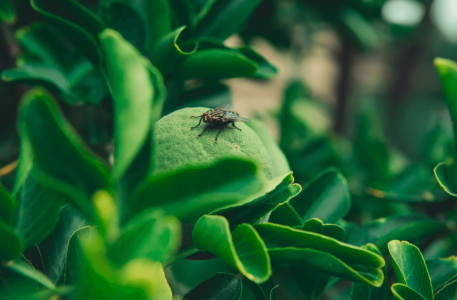How Fruit Flies Are Helping Scientists Understand Alzheimer's Disease
- Replies 0
For those who suffer from Alzheimer's disease, daily life can still be a challenge.
Unfortunately, there is no known cure for the condition, and to make matters more difficult, finding an effective treatment approach has been complicated due to a lack of knowledge of its underlying cause.
But that could be changing soon, thanks to a team of Australian scientists who have been studying a very unlikely research subject: fruit flies.
The team, led by a group from Melbourne's Walter and Eliza Hall Institute (WEHI), have released a new study that could help us to understand how an elevation of the mitochondrial TOMM40 gene can increase the risk of developing Alzheimer's.

Their findings, recently published in the journal Scientific Reports, shed light on the processes behind neurodegeneration and could possibly point the way to the development of new treatments for conditions like Alzheimer's.
The strong genetic link between increased levels of the TOMM40 gene and the development of the disease has fascinated scientists since its discovery, given that it is located next to the 'Alzheimer's gene' (ApoE).
This prompted the research team to use fruit flies as a way to trace exactly how too much TOMM40 can cause brain shrinkage, independently of the Alzheimer's gene.
They genetically engineered the flies to produce excessive levels of the protein and then observed its effect on the eyes of fruit flies larvae.
The team's findings revealed evidence of a cell death called apoptosis, which is responsible for regular cell turnover and maintenance. This may be the missing link in the equation and a possible target for early intervention in cognitive conditions.

The lead researcher, Dr Agalya Periasamy, noted that a better understanding of why neurons die could help create new ways to intervene in the process and potentially prevent further cell death.
Their study also showed that TOM complex formation is disrupted when too much of the protein is present, throwing off the balance in the mitochondria and activating the apoptosis. (TOMM40 is part of a larger protein complex called 'TOM' that assembles on the mitochondria, where its main function is to import essential proteins.)
The research team is confident that their findings could be used to develop much-needed therapeutic interventions for Alzheimer's disease and offer hope to those living with it.

We can only hope that future studies build on this research to eventually give Alzheimer's patients and their families the hope they need to enjoy life to its fullest.
Are you ever amazed by how much science can learn from nature? Who knew that fruit flies might have the answers when it comes to tackling serious illnesses such as Alzheimer's disease?
Keep an eye out, as this could be the beginning of a new wave of treatments that slow down the progression of the disease, and provide simpler ways to keep us all living healthier lives as we age.
Members, if you or anyone you know is living with Alzheimer's disease or cognitive issues, remember that early intervention can help.
Visit your local doctor or healthcare professional and ask for advice on the best options for you or your loved ones. Above all, remember that you are certainly not alone - you have a support system here at the SDC. We are here to help, so please reach out to us whenever you need us.
Unfortunately, there is no known cure for the condition, and to make matters more difficult, finding an effective treatment approach has been complicated due to a lack of knowledge of its underlying cause.
But that could be changing soon, thanks to a team of Australian scientists who have been studying a very unlikely research subject: fruit flies.
The team, led by a group from Melbourne's Walter and Eliza Hall Institute (WEHI), have released a new study that could help us to understand how an elevation of the mitochondrial TOMM40 gene can increase the risk of developing Alzheimer's.

Researchers in Australia have been using fruit flies to try and figure out more about Alzheimer's and other similar brain diseases. Credit: Unsplash/Andriyko Podilnyk.
Their findings, recently published in the journal Scientific Reports, shed light on the processes behind neurodegeneration and could possibly point the way to the development of new treatments for conditions like Alzheimer's.
The strong genetic link between increased levels of the TOMM40 gene and the development of the disease has fascinated scientists since its discovery, given that it is located next to the 'Alzheimer's gene' (ApoE).
This prompted the research team to use fruit flies as a way to trace exactly how too much TOMM40 can cause brain shrinkage, independently of the Alzheimer's gene.
They genetically engineered the flies to produce excessive levels of the protein and then observed its effect on the eyes of fruit flies larvae.
The team's findings revealed evidence of a cell death called apoptosis, which is responsible for regular cell turnover and maintenance. This may be the missing link in the equation and a possible target for early intervention in cognitive conditions.

They're hoping the studies might help us come up with new ways to prevent and treat brain diseases like dementia and Alzheimer's. Credit: Pexels/Anna Shvets.
The lead researcher, Dr Agalya Periasamy, noted that a better understanding of why neurons die could help create new ways to intervene in the process and potentially prevent further cell death.
Their study also showed that TOM complex formation is disrupted when too much of the protein is present, throwing off the balance in the mitochondria and activating the apoptosis. (TOMM40 is part of a larger protein complex called 'TOM' that assembles on the mitochondria, where its main function is to import essential proteins.)
The research team is confident that their findings could be used to develop much-needed therapeutic interventions for Alzheimer's disease and offer hope to those living with it.
Key Takeaways
- There's no cure for Alzheimer's and it's hard to figure out how to treat it well because we don't know what causes it.
- But that might not be the case for long. Scientists in Australia have been doing experiments with fruit flies and it might help us understand more about the condition.
- Their findings are giving us more insights into how our brain cells die and it might just help us find new ways to treat cognitive diseases like dementia and Alzheimer's in the future.
Are you ever amazed by how much science can learn from nature? Who knew that fruit flies might have the answers when it comes to tackling serious illnesses such as Alzheimer's disease?
Keep an eye out, as this could be the beginning of a new wave of treatments that slow down the progression of the disease, and provide simpler ways to keep us all living healthier lives as we age.
Members, if you or anyone you know is living with Alzheimer's disease or cognitive issues, remember that early intervention can help.
Visit your local doctor or healthcare professional and ask for advice on the best options for you or your loved ones. Above all, remember that you are certainly not alone - you have a support system here at the SDC. We are here to help, so please reach out to us whenever you need us.







